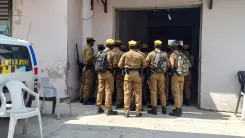Why Was Ranya Rao Denied Bail for One Year?

Synopsis
Key Takeaways
- The COFEPOSA Act has been upheld against Ranya Rao.
- No bail petition can be filed for one year.
- Ranya Rao remains in custody pending further developments.
- The DRI continues to investigate the gold smuggling case.
- Legally, the implications of this case are significant for economic offenses.
Bengaluru, July 17 (NationPress) The Advisory Board operating under the Directorate of Revenue Intelligence (DRI) has confirmed the application of the Conservation of Foreign Exchange and Prevention of Smuggling Activities (COFEPOSA) Act against the incarcerated Kannada actress Ranya Rao.
On Thursday, the board also mandated that no bail petition may be filed on behalf of Ranya Rao for a period of one year from her arrest, as stipulated by the COFEPOSA Act.
The Advisory Board instructed the DRI that no bail application should be submitted for Ranya Rao. Following these instructions, the DRI communicated this information to the prison authorities.
Previously, Ranya Rao had been granted bail by a special court. However, since the case falls under a specific law, her release did not occur.
The Central Economic Intelligence Bureau (CEIB), a key agency under the Ministry of Finance, invoked the COFEPOSA Act against the actress and other suspects in the gold smuggling incident, based on a recommendation from the Directorate of Revenue Intelligence (DRI), which is conducting the investigation.
According to the provisions of the COFEPOSA Act, she must remain in custody for a maximum of one year.
On May 20, the Special Court for Economic Offences granted conditional bail to Ranya Rao and the second accused, Tarun Raju.
She had aspirations to obtain bail, particularly after her mother contested the activation of the COFEPOSA Act in court.
The accused had requested bail on the grounds that the Directorate of Revenue Intelligence (DRI) did not submit the charge sheet within 60 days. Considering this, the court had previously granted bail.
In light of these developments, the Advisory Board, the statutory body within the DRI, reviewed the situation and reaffirmed the use of the Special Act against Ranya Rao.
Ranya Rao was apprehended on March 3 in connection with a gold smuggling case and has been detained for over four months.




